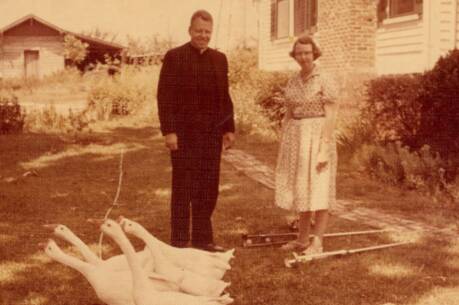Below is the text of Pope Francis’ weekly Wednesday audience, delivered on June 7, 2023.
To receive these remarks and more in your inbox every week, sign up for America’s daily newsletter.
Dear brothers and sisters, good morning!
Here before us are the relics of St. Therese of the Child Jesus, universal patroness of missions. It is good that this happens while we are reflecting on the passion for evangelization, on apostolic zeal. Today, then, let us allow the witness of St. Therese to help us. She was born 150 years ago, and I plan to dedicate an Apostolic Letter to her on this anniversary.
She is patroness of the missions, but she was never sent on mission. She was a Carmelite nun who lived her life according to the way of littleness and weakness: she defined herself as “a small grain of sand.” Having poor health, she died at the age of only 24. But though her body was sickly, her heart was vibrant, missionary. She recounts in her “diary” that her desire was that of being a missionary, and that she wanted to be one not just for a few years, but for the rest of her life, even until the end of the world. Therese was a “spiritual sister” to several missionaries: she accompanied them from her monastery through her letters, through her prayer, and by offering continuous sacrifices for them. Without being visible, she interceded for the missions, like an engine that, although hidden, gives a vehicle the power to move forward. However, she was often not understood by her fellow nuns: she received “more thorns than roses” from them, but she accepted everything lovingly, patiently, offering even these judgments and misunderstandings together with her illness. And she did this joyfully, for the needs of the Church, so that, as she said, “roses might fall on everyone,” especially the most distant.
Pope Francis: Without being visible, St. Therese of Lisieux interceded for the missions, like an engine that, although hidden, gives a vehicle the power to move forward.
Now, I ask, where did all this zeal, this missionary strength, and this joy of interceding come from? Two episodes that occurred before Therese entered the monastery help us to understand this.
The first concerns the day that changed her life, Christmas 1886, when God worked a miracle in her heart. Shortly after that, Therese would turn 14 years old. As the youngest child, she was pampered by everyone at home. Returning from midnight Mass, however, her very tired father did not feel like being there when his daughter opened her gifts, and said, “Good thing it’s the last year!” Therese, who was very sensitive and easily moved to tears, was hurt, and went up to her room and cried. But she quickly suppressed her tears, went downstairs and, full of joy, she was the one who cheered her father.
What had happened? On that night, when Jesus had made himself weak out of love, her soul became strong: in just a few moments, she had come out of the prison of her selfishness and self-pity; she began to feel that “charity entered her heart, with the need to forget herself” (cf. Manuscript A, 133-134). From then on, she directed her zeal toward others, that they might find God, and, instead of seeking consolations for herself, she set out to “console Jesus, [to] make him loved by souls,” because, as Therese, Doctor of the Church, noted, “Jesus is sick with love and [...] the sickness of love cannot be cured except by love” (Letter to Marie Guérin, July 1890). This then was her daily resolution: to “make Jesus loved” (Letter to Céline, 15 October 1889), to intercede for others. She wrote, “I want to save souls and forget myself for them: I want to save them even after my death” (Letter to Fr. Roullan, 19 March 1897). Several times she said, “I will spend my heaven doing good on earth.”
Pope Francis: A missionary is anyone who lives as an instrument of God’s love where they are. Missionaries are those who do everything so that, through their witness, their prayer, their intercession, Jesus might pass by.
Following the example of Jesus the Good Shepherd, her zeal was directed especially toward sinners, to “those far off.” This is revealed in the second episode. Therese learnt about a criminal, Enrico Pranzini, sentenced to death for horrible crimes: he had been found guilty of the brutal murder of three people, and was destined for the guillotine; but he did not want to receive the consolations of the faith. Therese took him into her heart and did all she could: she prayed in every way for his conversion, so that he, whom, with brotherly compassion she called “poor wretched Pranzini,” might demonstrate a small sign of repentance and make room for God’s mercy in which Therese trusted blindly.
The execution took place. The next day, Therese read in the newspaper that Pranzini, just before laying his head on the block, “all of a sudden, seized by a sudden inspiration, turned around, grabbed a Crucifix that the priest handed to him and kissed three times the sacred wounds” of Jesus. The saint remarked, “Then his soul went to receive the merciful sentence of the One who declared that in Heaven there will be more joy for a single sinner who repents than for the ninety-nine righteous who have no need of repentance!” (Manuscript A, 135).
Such is the power of intercession moved by charity; such is the engine of mission! Missionaries, in fact—of whom Therese is patroness—are not only those who travel long distances, learn new languages, do good works, and are good at proclamation; no, a missionary is anyone who lives as an instrument of God’s love where they are. Missionaries are those who do everything so that, through their witness, their prayer, their intercession, Jesus might pass by.
This is the apostolic zeal that, let us always remember, never works by proselytism or constraint, but by attraction: one does not become a Christian because they are forced by someone, but because they have been touched by love. With so many means, methods, and structures available, which sometimes distract from what is essential, the Church needs hearts like Therese’s, hearts that draw people to love and bring people closer to God. Let us ask this saint for the grace to overcome our selfishness and for the passion to intercede that Jesus might be known and loved.







